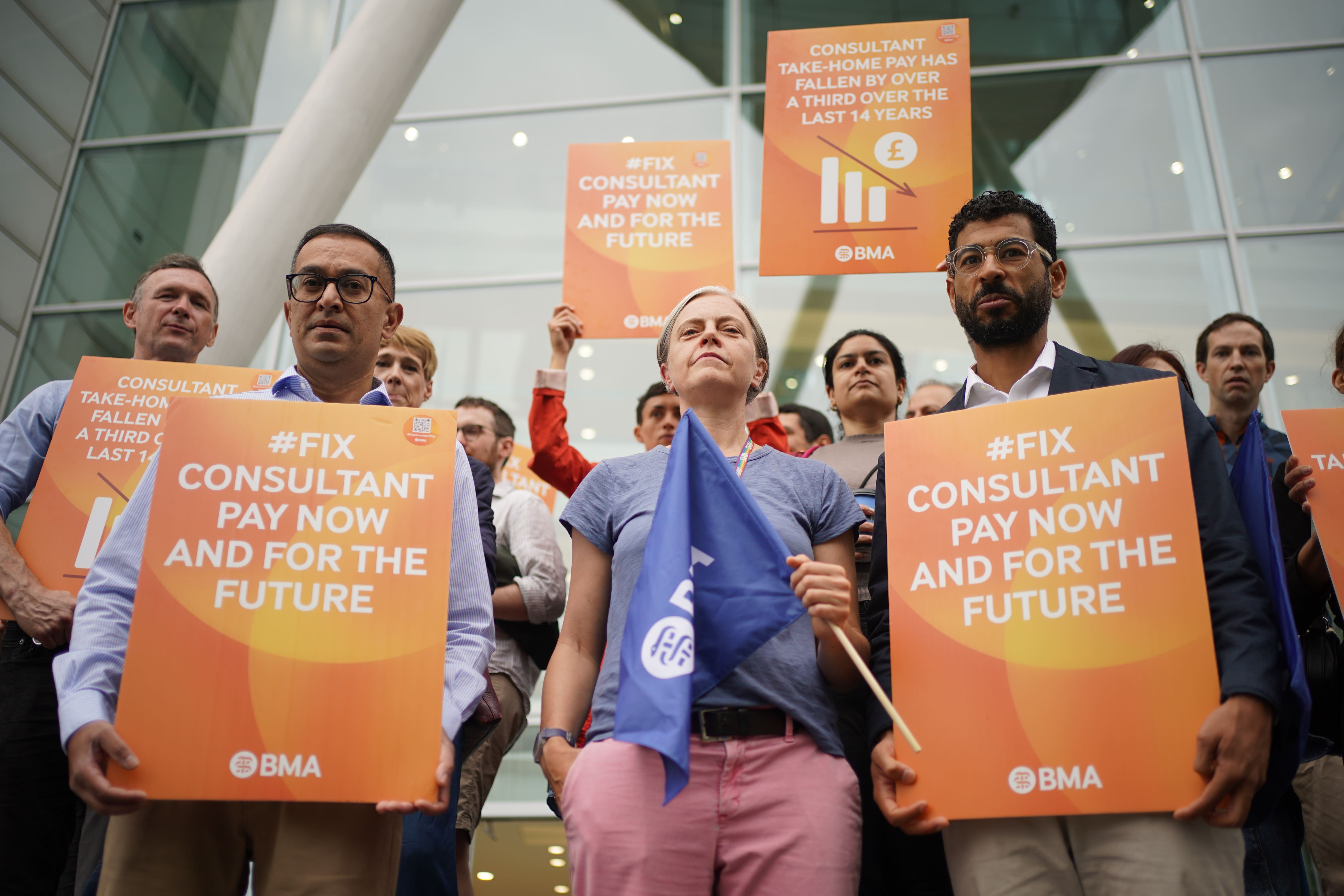‘Not in our DNA to strike’, say consultants as second walkout under way
Strikes have led to the cancellation of almost 900,000 NHS appointments, with warnings the figure could soon hit the ‘grim milestone’ of one million.

Your support helps us to tell the story
From reproductive rights to climate change to Big Tech, The Independent is on the ground when the story is developing. Whether it's investigating the financials of Elon Musk's pro-Trump PAC or producing our latest documentary, 'The A Word', which shines a light on the American women fighting for reproductive rights, we know how important it is to parse out the facts from the messaging.
At such a critical moment in US history, we need reporters on the ground. Your donation allows us to keep sending journalists to speak to both sides of the story.
The Independent is trusted by Americans across the entire political spectrum. And unlike many other quality news outlets, we choose not to lock Americans out of our reporting and analysis with paywalls. We believe quality journalism should be available to everyone, paid for by those who can afford it.
Your support makes all the difference.Consultants have said it is “not part of their DNA to be on strike” after NHS leaders warned patients could face “severe delays” during the latest spell of industrial action.
Senior doctors walked out at 7am on Thursday, operating on a “Christmas day cover” basis – meaning emergency care will still be provided – until 7am on Saturday.
NHS England’s national medical director for secondary care Dr Vin Diwakar said the walkout would “hit the NHS hard” with “almost all routine care being affected” during a time when many staff are taking annual leave.
Industrial action by senior doctors shows no sign of slowing down; they have already threatened to strike again for two days from September 19 and announced strikes for October 2, 3 and 4 if the Government continues to refuse talks.
Speaking on the picket line outside Leeds General Infirmary, consultant gynaecologist and British Medical Association (BMA) strike supervisor Tracy Jackson told the PA news agency: “We’re really concerned about the future of the National Health Service, and one of the biggest issues is recruitment and retention of doctors, trainees and consultants.”
Ms Jackson claims she has watched colleagues “leave, decide to do other things, work in other countries or leave medicine altogether”.
“Our passion is looking after patients,” she added. “I went to medical school 40 years ago and it’s not part of our DNA to be on strike.
“The last thing we wanted to do is be on strike and to be on strike again, to be fair …it’s really demoralising and depressing that our voices aren’t being heard.”
She claims there has been “no negotiation” with the Government and “nothing’s happening” in spite of “all the desperation to get into conversation and discussions”.
Ms Jackson said: “I’m a surgeon, not a politician, and I just have to keep trying. This is the one way that we have because we have to make a stand and try and make our voices heard and this seems to be the only way, so we’re going to keep going.”
The Government has insisted that talks on pay are over after it said consultants would receive a 6% rise.
The BMA has condemned the increase as “insulting”, claiming consultants have experienced a “35% pay erosion” over the last 14 years. The union is also calling for reform of the medics’ pay review body.
Ms Jackson said it was “sad” that patients would be affected by the strike, but claimed the proportion was “small” when compared to the “overwhelming waiting lists that already existed”.
It was revealed earlier this month that NHS waiting lists had climbed to a record 7.6 million.
Prime Minister Rishi Sunak made cutting the figure a top priority for his Government at the start of 2023 but had previously said strike action – which has been ongoing across the NHS since December 2022 – was making it challenging.
Ms Jackson added: “It’s devastating for us that patients are being inevitably affected by this. But we’re already in a parlous state of affairs with underinvestment in the National Health Service.”
Strike action over nine months has led to the cancellation of 839,327 inpatient and outpatient hospital appointments.
If community and mental health figures are included, the total rises to nearly 900,000 – although this does not reflect the overall number of actual cancellations, due to some duplication of data.
Danny Mortimer, deputy chief executive of NHS Confederation, warned the bank holiday strikes “will again have a significant impact on patients”, adding that cancelled appointments could soon reach the “grim milestone” of one million.
I don't think we can be blamed for NHS waiting lists because of a few days of strike action. This is the third day of consultant strike action, I think that would be really dishonest
But Ms Jackon said it would be “dishonest” to blame consultants for the rising figure.
“I don’t think we can be blamed for NHS waiting lists because of a few days of strike action. This is the third day of consultant strike action, I think that would be really dishonest,” she said.
People should continue to use 999 for life-threatening emergencies and NHS 111 for other health concerns, officials said. GP and pharmacies were largely unaffected.